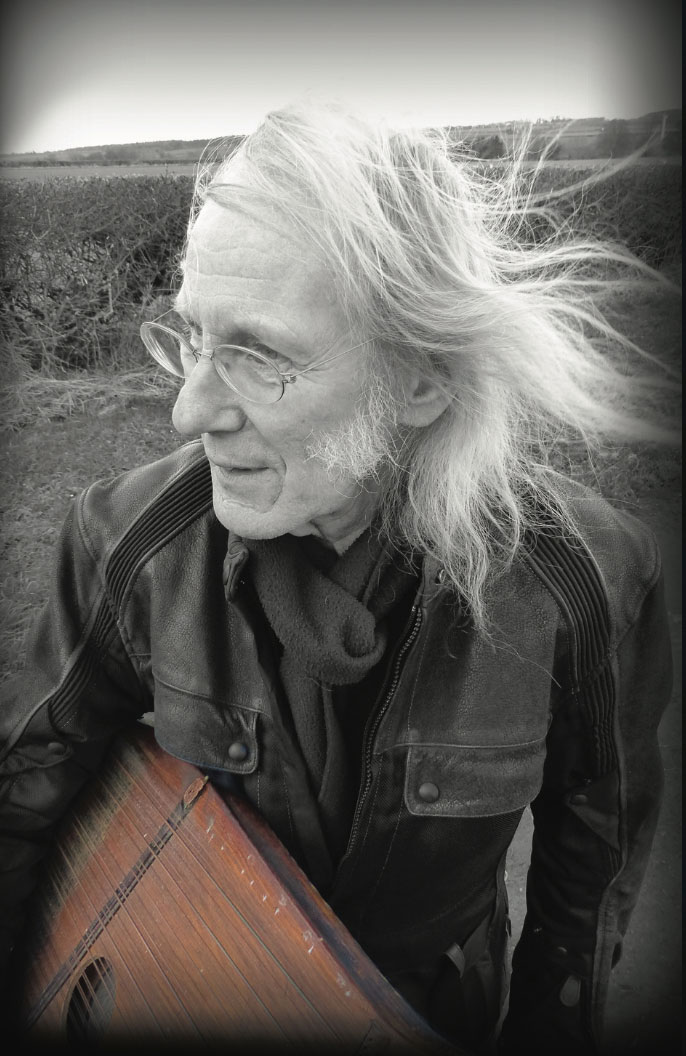Andrew Cronshaw was born April 18, 1949 in Lancashire, United Kingdom. He is known for both his music and his writing. His writing appeared frequently in British publication FRoots and other magazines. And he is also the author of the chapters devoted to Finland, Norway, Sweden, Denmark, The Faroes, Iceland, the Baltic States and Portugal in the most recent version of the Rough Guide to World Music.
Musically, Andrew’s voyage began as a child with a piano and a tin whistle. His primary instrument is now the zither, which lives at the heart of a collection of instruments that have come into his life through his travels, research and enormous musical curiosity. These include: a fujara, which Andrew describes as “a five-foot long Slovakian shepherd’s flute that yields shivering breathy harmonics;” aba-wu from China’s Yunan province, which is his “seductive-toned” brass-reed instrument, and many other string and percussion instruments.
In the early 1990s, Andrew chose to tour most often as a solo performer. With his instruments and a small PA, he played more than 100 performances in ancient English village churches. Solo, in his case, meant he would book the concert, meet the audience at the door, perform, pack up and move on.
Although a U.K. native, over the past twelve years more and more of his time has been spent in Finland. He is fascinated by and increasingly involved in new Finnish music rooted in its folk traditions. Andrew says he is drawn also by the sense of community, especially in Kaustinen, a music center and home to one of the world’s finest music festivals. It was at the Kaustinen Festival he initiated Hauenleuka: a large performance project that involved the floating of a giant seven-meter, five-string kantele down the river Perho accompanied by four hundred local musicians and dancers.
His album On The Shoulders Of The Great Bear, is based on a dozen traditional tunes from Finland, one from Siberia, and three from the Scottish Gaelic-speaking tradition.
Andrew founded an ensemble called SANS, a collaboration with Finnish musicians.
Andrew’s approach to music includes the belief that instruments “find a particular tune they like.”
In 2020, he released Zithers, his twelfth album. Andrew says about the album “Zithers”: “The word ‘zither’ to some people means what Anton Karas played for the film The Third Man. That was a so-called ‘concert zither’, a fretted zither relative of Hungarian citera, Norwegian langeleik, Appalachian dulcimer et al. But actually there are a huge number of instruments in the zither family, some fretted but most not. Broadly speaking, a zither can be taken to be an instrument with one or more plucked, struck or bowed strings stretched across a sound board or other resonator, but without a neck.
On this album I’d envisaged probably playing various string and wind instruments, but as it turns out it’s all on just two, both of them unfretted forms of zither.
Ten of the tracks are on a 74-string fretless zither, named “The Piano-Chord”, made in Germany, probably in about the 1930s, that I bought in Edinburgh in the late 1960s, and electrified with a pickup made for it by Phil Taylor.
The other three tracks are on a more recent creation, the marovantele, which has 11 pairs of strings on each side and was made for me by Finnish luthier Kimmo Sarja from a sketched idea I had, inspired by the Madagascan double-sided marovany box zither, for a double-sided development of the Finnish kantele (yet another of the zither family). (I’ve been involved in various ways with Finnish music since 1990, and I toured worldwide in the 1990s as sound engineer with Madagascan band Tarika, who used the range of Malagasy instruments including marovany).”
Produced by Jim Sutherland, it was recorded in Scotland, Andrew’s first chosen home, and the material for seven of the thirteen pieces comes from Scottish and Scots Gaelic traditions. His life and music have also been strongly influenced by Finno-Ugrian, Iberian and English traditions, among others, and they’re reflected too.
As he says “Nowadays in the course of our lives we’re affected by a wide range of music, so each of us carries a sort of personal tradition”.
Discography:
A Is For Andrew, Z Is For Zither (XTRA, 1974)
Times And Traditions For Dulcimer (Trailer, 1976)
Earthed In Cloud Valley (Trailer, 1977)
Wade In The Flood (Transatlantic Records, 1978)
The Great Dark Water (Waterfront Records, 1982)
Till The Beasts’ Returning (Topic Records, 1988)
The Andrew Cronshaw CD (Topic Records, 1989)
The Language Of Snakes (Special Delivery, 1993)
On The Shoulders Of The Great Bear (Cloud Valley Music, 2000)
Ochre (Cloud Valley Music, 2004)
The Unbroken Surface Of Snow (Cloud Valley Music, 2011)
Live, with SANS (Cloud Valley CV2014, 2014)
Kulku, with SANS (Cloud Valley Music, 2018)
Zithers (Cloud Valley, 2020)



Updated biography and discography